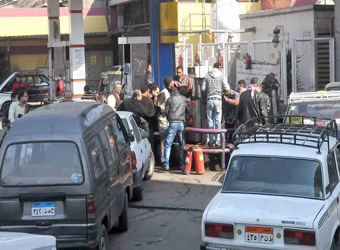Egypt’s military rulers have secured record supplies of fuel worth at least $1.2 billion for the summer months, paying trading houses such as Vitol and Glencore above market prices to satisfy demand as political instability deepens.
Fuel shortages provoked public anger earlier this year. But trying to avoid a repeat is proving costly as uncertainty about Egypt’s move to democracy has frightened off many traditional suppliers, leaving trading houses as the dominant players.
“(The premium) is considerable – if the threat is real enough … maybe 25 percent,” said one trader with a trading house that supplies fuel to Egypt, adding that the final contract details were still being settled.
Egypt is following a similar path to debt-stricken Greece, which is surviving on oil supplies from the same traders who take on the risk of dealing with countries in crisis or at war in return for hefty price premiums.
In the past week, Egypt’s generals have ordered the dissolution of the Islamist-led parliament and effectively curbed the powers of the next president as the country still awaits results of the presidential run-off last Saturday and Sunday.
In May, Egypt tendered to buy record volumes of diesel and gasoline before the presidential elections, apparently wary about the risk of renewed civil unrest after last year’s revolution.
Instability has also made it difficult for Egypt’s fuel suppliers to obtain letters of credit from major banks, which led to queues of vessels being held up in Egyptian waters at the start of June.
Delays, which incur demurrage fees of hundreds of thousands of dollars, have become common and are further testing Egypt’s troubled financial system and threatening its faltering economy.
Diesel is mainly used to power heavy machinery, run agricultural and military vehicles, and generate electricity, demand for which rises steeply during the hot summer months.
Trading sources told Reuters that Egypt was negotiating with traders on the final details of contracts to supply 36 cargoes of diesel and 12 cargoes of gasoline over the next three months.
“In terms of cargo volumes, this year their requirements are flying through the roof,” said a London-based trader.
At market prices, the diesel cargoes would be worth over $920 million and the gasoline another $330 million, but Egypt has agreed to pay big premiums, traders said.
A typical diesel cargo of 30,000 tonnes is worth over $25 million at current prices and even a 5 percent premium would mean a jump in the final bill of $1.25 million.
“It is all about risk versus reward, and clearly the reward is outpacing all of the risks,” said a Dubai-based trader.
He added that some oil majors could not participate in the tenders because of a high level of risks and complications with letters of credit from banks. “Big majors who need all the paperwork are out, and trading houses are in,” he said.
In the diesel tenders, Vitol and Glencore were expected to win the lion’s share of contracts, traders said.
Swiss-based Vitol has won a deal to supply Egypt with 12 cargoes of diesel to the port of Suez over the next three months, while Glencore will be among the main suppliers of 24 diesel cargoes to the ports of Alexandria and El Dekhalia on the Mediterranean.
French oil major Total’s Geneva-based trading arm and China’s Petrochina were also said to have won shares of the Mediterranean diesel supply contract.
In gasoline, Glencore, Total and trader BB Energy will supply cargoes to Suez at premiums to regional quotes of around $50-$60 a tonne, which would represent a 6-7 percent premium to current market prices.
Total, BP and Socar will supply gasoline to Alexandria at premiums of above $30 a tonne with one cargo priced at a premium of $52 a tonne, traders said.



